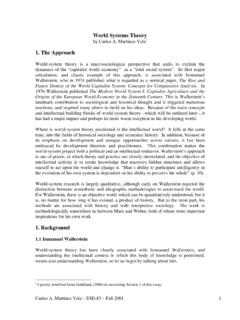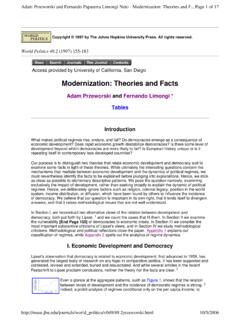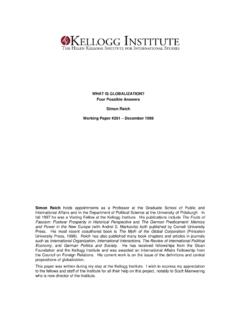Transcription of Theories of Development
1 International Journal of Language and Linguistics Vol. 2, No. 1; March 2015 78 Theories of Development Bubaker F. Shareia Associate Professor Department of Accounting Faculty of Economics University of Benghazi Libya Abstract The aim of this paper is to provide an understanding of the role of accounting information system (AIS) in developing countries in a global economy. It extends this argument to developing countries. To explore this argument, reviews of four different Theories of economic Development are discussed. The paper first considers these Theories of economic Development and shows how significant AIS are in developing countries in the global economy. The purpose of this paper is to review alternative Theories of Development and assess their relative applicability the study of AIS in developing countries.
2 Finally, this paper will select the theory most suitable for this study and justify why it is most suitable. Keywords: Theories of Development , accounting information systems, developing countries, globalisation 1. Introduction Development theory by itself has little value unless it is applied, unless it translates into results, and unless it improves people s lives (Lewis T. Preston, Former President, World Bank, Quoted in Todaro 2000, p. 77) Within the discipline of Economics, there is a subcategory of economic Development , which is somewhat new. It seeks to apply identified tools and approaches to the economic, social and institutional aspects of developing countries in order to achieve improvements in the standard of living (Belkaoui 1994, p. 2; Todaro 2000, p. 7). The focal point of this kind of economics is the economic condition of developing countries regarding these matters and the Development of policies that improve a nation s position economically, socially and institutionally.
3 Theories of Development were stimulated by the situation in the mid 20th century when decolonization occurred and the economic disparity between European and underdeveloped nations became obvious. Others believe that it is more accurate to evaluate Development economics as a general provider of organized systems (Todaro 2000). Consequently, social, economic and political aspects are included in Theories of economic Development , which apply different models related to different key concepts (Martinussen 1997; Roberts and Hite 2000). One effective method through which the differentiation between various Theories can be recognized is by their classification, based on the primary concept each theory identifies as the driver of economic Development , whether internal or external. Several definitions exist for Development and offer different focal concepts.
4 For instance, Modernisation theory stresses the cultural features of each society, such as political, religion and culture. On the other hand, World Systems theory and Globalisation seek to evaluate external relationships and to define different points in the Development of countries. Consequently, every theory , having identified a driving concept, then proposes specific strategies which should be applied (Olson 1963; Parsons 1964) to achieve economic Development . Modernisation Development theory , with a focus on culture, suggests internal cultural reforms or changes in social or political organisations. In a different way, Dependency theory and World Systems theory , with an external focus, rely on external reformation policies that deal with relations between dependent and independent countries (Cardoso and Faletto 1979; Szymanski 1982).
5 The following sections deal with four different Theories of economic Development , highlighting the distinctive main focus and the resultant policies of each. The main features of each are summarised in Table 1. ISSN 2374-8850 (Print), 2374-8869 (Online) Center for Promoting Ideas, USA 79 2. modernization theory Modernisation theory has been defined as a theory (Reyes, 2001a) that uses a systematic process to move underdeveloped countries to a more sophisticated level of Development . It is a US and European-centric normative model of Development . The focus of Modernisation theory is cultural change directed at institutional structures in non-industrialized countries. Modernisation theory explains inequality within or between states by identifying different values, systems and ideas held by different nation states (Martinussen 1997, pp.)
6 61-66, 167-172). Modernisation theory emerged in the late 1950s when it appeared as a North American political scientists reaction to the incipient failure of many of the prescriptions of Development economists (Rapley 2002, p. 15). While Modernisation theory stresses the importance of political Development in the progress and climactic improvement of a nations economic standing, it also acknowledges social and cultural reforms. It should be added also that Modernisation theory is completely different from Development economics, which is the first or basic model of Development theory . Modernisation is appropriate for political Development , but also can be used for any liberal Theories of modernisation that appeared after 1945 targeting the nation-states of the Third World (Berger 2004, p.
7 87). Consequently, the focal point of Modernisation theory is on political Development with levels of coverage that consider history, sociology, political sciences in general, and area studies. It is a commonly held idea (Haque 1999, p. 72) that the reason for the emergence of Modernisation theory was the freedom of Third World countries from colonization and the strategies employed during the Cold War by Western countries in order to prevent these countries from being controlled by communists. Haque (1999) refers to what Preston explicitly states about this issue, pointing out that the presents Modernisation as an attack on the former USSR s widespread socialistic belief. Thus, Modernisation theory is a by-product of a political reaction against the communist ideology. Theories of Modernisation, according to Chase-Dunn (2000, p.
8 216), stress the shift of modern technology and develop institutions and labour habits complementary to industrial production. They also consider the impact of modern beliefs on people, families and society as a whole. Modernisation theory treats Development as a phased process. Reyes (2001, p. 2) referred to Rostow s (1962) five identified stages, which give shape to the Modernisation theory of Development : The traditional society; Preconditions for take-off; Take-off; The road to maturity The age of mass consumption. Traditional society was famous for a limited range of production. Such a society suffered from a false understanding of environmental capabilities and from a shortage of technology and advanced tools that produced a limitation in production. It represented a biased social classification pattern with the political point of focus on a specific region (Rostow 1962, p.
9 311). The first steps for advancement from traditional society in Europe stemmed from two important happenings that occurred after the Middle Ages: the Development of modern science and ideologies and the subsequent land discoveries that led to the increase in trade, and the competitive struggles to avoid becoming European territories (Rostow 1962, p. 312). These are considered to represent the preconditions for take-off. The take-off stage starts from the rise of new industries with the application of new industrial techniques, for example, the growth of cotton textiles, timber cutting and the railroad industry (Rostow 1962, p. 317). The road to maturity stage involves the widespread application of technology in its full range. This phase is actually the time of expansion in which some new fields developed into rivals of older sectors (Rostow 1962, p.
10 318). As a society recognises its need for greater security, welfare and leisure to its labouring forces, it moves into on age of mass consumption. This leads to the provision of extensive private consumption like durable goods, and an extension of power internationally for the nation (Rostow 1962, p. 323). Guilhot (2005, p. 120) recognized that as a country moved to the age of mass consumption, it sought Development aid and foreign support. International Journal of Language and Linguistics Vol. 2, No. 1; March 2015 80 Along with this support came expectations of democratization on the part of the developed countries providing aid. This relatively conservative understanding emanated from a hegemonic belief in the rights of human beings. Based on the last two stages identified by Rostow (1962), which are the road to maturity and mass consumption, accounting plays a vital role as a modern technology.









